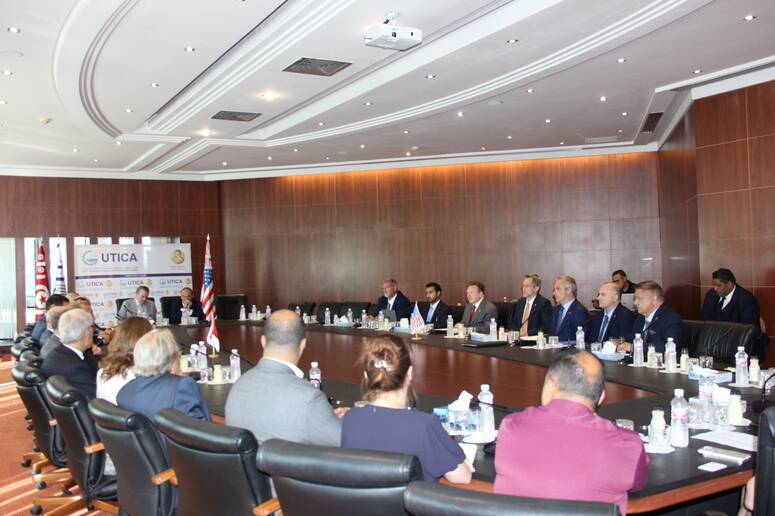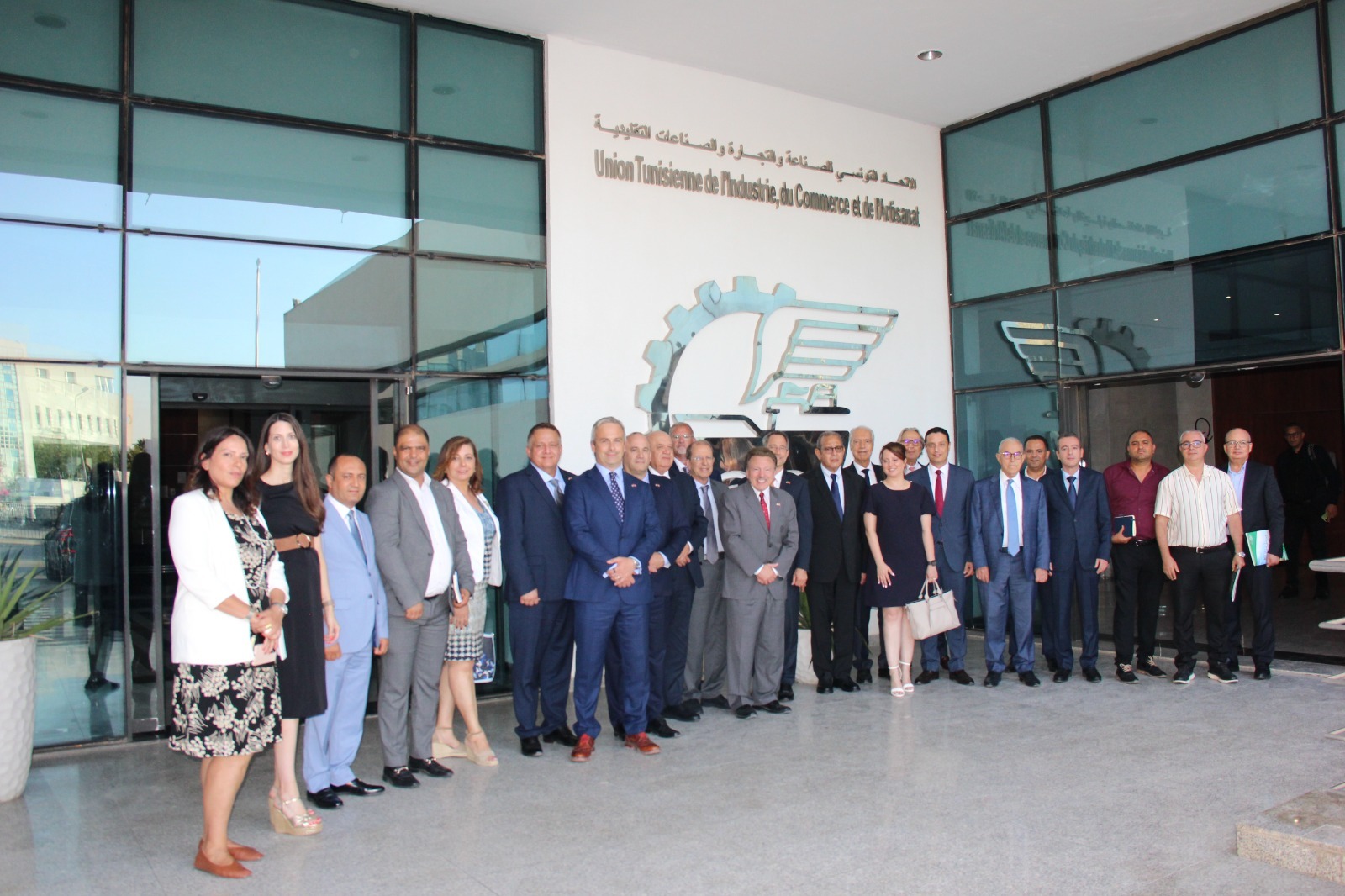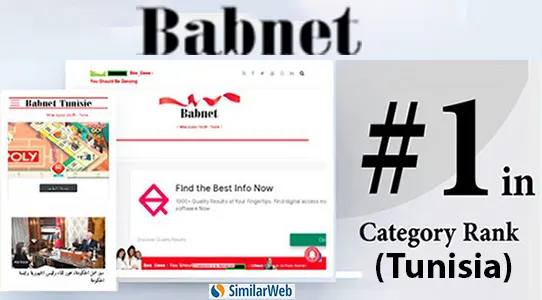Tunisia: Working Session Between UTICA and the National U.S.-Arab Chamber of Commerce

A working session was held on Friday, July 11, 2025, at the headquarters of the Tunisian Union of Industry, Trade and Handicrafts (UTICA), bringing together a delegation from UTICA led by Mr. Samir Majoul, President of the Union, and a delegation from the National U.S.-Arab Chamber of Commerce headed by its President Mr. David Hamod, with the participation of the U.S. Ambassador to Tunisia, Mr. Joey Hood.
The U.S.-Arab Chamber’s delegation included a distinguished group of representatives from leading companies operating in strategic sectors such as international trade and investment between the U.S. and the MENA region, advancements in financial technology and digital payment systems, cutting-edge innovations in drone technology, as well as support for sustainable agriculture and food security through grain storage technologies and improved agricultural value chains.
The U.S.-Arab Chamber’s delegation included a distinguished group of representatives from leading companies operating in strategic sectors such as international trade and investment between the U.S. and the MENA region, advancements in financial technology and digital payment systems, cutting-edge innovations in drone technology, as well as support for sustainable agriculture and food security through grain storage technologies and improved agricultural value chains.
The UTICA delegation included members of the national executive board, UTICA officials, and representatives from several sectors, including olive oil and date exports, robotics, aircraft parts manufacturing, automotive components, and financial technology, along with the President of the American Chamber of Commerce in Tunisia.

Mr. Samir Majoul emphasized the importance of this initiative, highlighting the growing American interest in Tunisia’s economic environment. He stressed the need for joint efforts to establish partnerships based on complementarity, trust, and mutual benefit.
He pointed out Tunisia’s strategic location, making it an ideal regional hub due to its proximity to Europe, openness to the Arab world, and natural position as a gateway to Africa. He also cited Tunisia’s trade agreements, including the partnership with the European Union, the Arab Free Trade Agreement, and its membership in the African Continental Free Trade Area (AfCFTA). He expressed hope for launching a renewed dynamic of cooperation with the United States.
Mr. Majoul further noted the readiness of several sectors to embrace new industrial and commercial partnerships, including fintech and electronic payment systems, aircraft and automotive components, sustainable agribusiness, and renewable agriculture, in addition to logistics and agricultural storage.
He emphasized that the success of these partnerships depends on the complementarity of capabilities, combining U.S. expertise in innovation and capital with Tunisia’s flexible, competitive capacities and its proximity to neighboring markets.
He also highlighted promising avenues such as joint investments in third markets, including Africa, the Arab world, and Europe, where Tunisian companies have already built field experience.
From his side, Mr. David Hamod, President of the National U.S.-Arab Chamber of Commerce, underlined the importance of this meeting in strengthening economic relations between Tunisia and the United States. He affirmed that the private sector plays a pivotal role in advancing bilateral trade and shaping concrete partnerships between economic stakeholders in both countries.
Mr. Hamod pointed out that the Chamber’s delegation included representatives from strategic sectors such as food sovereignty, financial security, and defense, reflecting the diversity of potential areas of cooperation. He reiterated his commitment to supporting efforts aimed at expanding bilateral collaboration.
He also encouraged Tunisian actors to develop direct relationships with various U.S. states, noting that this would open up new prospects for balanced, mutually beneficial partnerships.
In the same vein, U.S. Ambassador Joey Hood considered that direct relations with the fifty U.S. states represent a strategic lever, equating it to "gaining fifty economic ambassadors inside the United States." He added that strengthening these ties could practically help rebalance the U.S. trade deficit with Tunisia and address some trade issues, including customs tariffs imposed on Tunisian exports to the U.S. market.
During the session, economic representatives from both sides gave in-depth presentations on their areas of activity, highlighting promising opportunities for strategic cooperation between Tunisia and the U.S. They also discussed structural challenges facing trade relations—particularly the negative impact of U.S. tariffs on Tunisian exports—and emphasized the need for effective mechanisms to overcome these obstacles, ensuring smoother trade and investment flows and enhanced economic integration.
The session also highlighted Tunisia’s unique geostrategic position at the crossroads of Europe, Africa, and the Arab world, along with its diversified industrial base and skilled human capital, as critical factors that enhance Tunisia’s attractiveness for foreign investment.
The discussions underscored the central role of the private sector in both countries as a true driver of economic growth and sustainable cooperation. Both parties called for the establishment of complementary, balanced partnerships that reflect shared aspirations and support economic diversification, innovation, and technology transfer across key sectors.
The session reaffirmed the strategic importance of U.S. investment in Tunisia as a lever to foster growth, technology transfer, and skill development. Both sides expressed their mutual desire to intensify efforts to support the inflow of U.S. investments into Tunisia and broaden cooperation opportunities, enabling Tunisian companies to better access the U.S. market and benefit from its potential.
They also confirmed their shared commitment to strengthening this partnership through a renewed vision based on equality and mutual respect, aiming to achieve sustainable, mutually beneficial outcomes across the economic spectrum.
Finally, the meeting shed light on the evolution of Tunisia’s economic landscape, the adaptability of its enterprises, and their openness to international markets. Many Tunisian companies are actively seeking entry into the U.S. market via industrial partnerships, technology transfer, and the establishment of distribution hubs or branches.






















Comments
0 de 0 commentaires pour l'article 311749